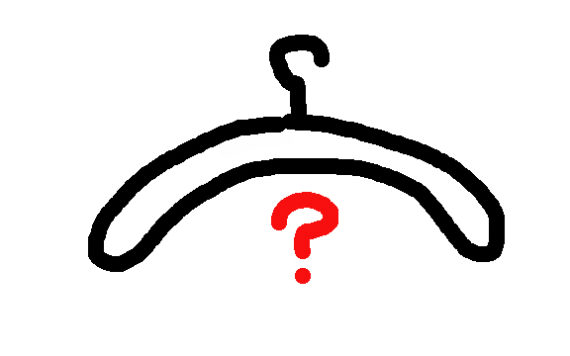The emperor’s new clothes idiom.
This ‘Emperors New Clothes’ subject follows on from my previous blog post about Arty Farty Bol**cks. In that post I talked about the pretentious and meaningless verbage that sometimes gets used in the art-marketing world. That subject has provoked this next one.

empty coat hanger!
Here is a synopsis of the story written by Hans Christian Anderson. A couple of conmen trick the Emperor into buying a non-existent ‘super suit of very fine clothes that only the most discerning people can see’. The gullible Emperor parades around in his new clothes and everybody sees that he is naked. But they all believe that that is because they themselves are ignorant and inferior. They are fooled by the reaction that others have who praise and flatter the Emperor by pretending that they do see the clothes. So every one goes along with the delusion. Then a small child pipes up and says that the Emperor is naked. That pops the bubble. But the conmen left town a while ago.
Delusion or conspiracy.
So are we similarly suffering under a collective delusion about fine art? Are we victims of a conspiracy where art is massively over valued?
Is the art world like that?
Is the Emperor actually wearing nothing at all?
My previous rant about Arty Farty Bol**cks might suggest that I think so. I have been in the art game for over half a century now, and so maybe I have some experience that is useful. I certainly questioned my art life to see if I was suffering the effects of a massive collective delusion. I even went out and got a part-time university degree in psychology to see if that helped. This is what I discovered….
Transactional analysis.
There is a very valuable small child in all of us. In fact this small ‘child’ is one of three states. The others are ‘adult’ and ‘parent’ states. This has been very well explained by Eric Berne MD in his book ‘ Games People Play’. He developed a major influential branch of psychology called transactional analysis.
The ‘child’ in us is where much of our emotional stuff is. The ‘adult’ is where we learn stuff, and the ‘parent’ does the teaching. Of course it is much more complex than that.
The ‘adult’ has learned that art has a real value from other ‘adults’, and the ‘parent’ has passed on our belief to others. But we all retain a small ‘child’ part of our mind where we feel things and from where we might notice that fine art value is invisible or visible.
A child’s view.
In this fine art context we could ask whether we have all been fooled by our own ‘adult’ and ‘parent’ states into the delusion that art is something special and very valuable.
However, it is quite noticeable that kids do really love making pictures. They enjoy the creative process. They progress through stages from meaningless daubs to subjective content.
As they gradually learn how to be ‘adults’ by copying they often drop their creative impulses. And by the time that they are nearly ten or so they could be quite good at being a ‘parent’ as well. This is when they want to influence and control others.
When the ‘adult’ and the ‘parent’ states are dominant in our lives then we might be fooled into paying much too much for a fine art object. We might collectively agree that a few million quid is the right price for a picture that took a couple of days to produce.
So is our ‘child’ state capable of noticing something that all our ‘adult’ and ‘parent’ states are blind to? Lets ask our ‘child’ whether they can see this value or not. Is there any value in fine-art or is it a delusion?
Conclusion.
My own ‘child’ state still exists and I still make my daubs in the studio. I have my walls covered in other artists work as well as my own. I really enjoy making and looking at paintings. My ‘child’ state says that art is a great activity and product.
But sometimes it is overpriced and my ‘child’ can see that the Emperor hasn’t got any clothes on.
I try to sell my own paintings and prints for a fair amount. That includes making, marketing, commission costs as well as my bit. I charge enough to be able live on the income.
I could tell you that they are worth millions. But I wont.
Quote.
WIKIPEDIA: …The phrase “emperor’s new clothes” has become an idiom about logical fallacies. The story may be explained by pluralistic ignorance. The story is about a situation where “no one believes, but everyone believes that everyone else believes. Or alternatively, everyone is ignorant to whether the emperor has clothes on or not, but believes that everyone else is not ignorant.




